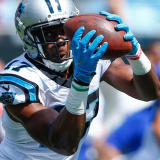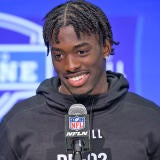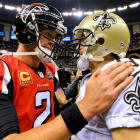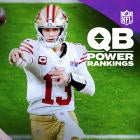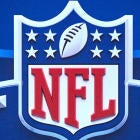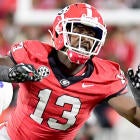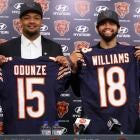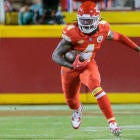The state of quarterback play in the NFL has never been better.
Not only did the 2018 season result in the highest average passer rating in the history of the NFL -- 92.9, which beat out 2015's 90.2 passer rating -- the way in which that league-high passer rating was achieved was remarkably diverse in terms of age, styles of play, and distribution among the divisions.
Chiefs 23-year-old quarterback Patrick Mahomes (113.8) captured MVP honors by becoming the second quarterback in NFL history to throw for 5,000 yards and 50 touchdowns in a single season. Patriots 41-year-old quarterback Tom Brady (97.7) won his sixth Super Bowl. Browns 23-year-old (he's now 24) quarterback Baker Mayfield (93.7) won real football games in Cleveland. Texans 23-year-old quarterback Deshaun Watson (103.1) proved he's the second-best quarterback under the age of 25. Ryan Fitzpatrick, 36, even chipped in with a 100.4 passer rating.
The NFL is in its golden age of quarterbacking, and it won't end when the likes of Brady, Brees, Roethlisberger, Rodgers, and Rivers eventually retire. They'll just pass the torch to the likes of Mahomes, Watson, and Mayfield -- and that's without even factoring in last year's or this year's rookie class.
All of this is just a long winded way of saying: With so many good quarterbacks, it wasn't easy to rank the eight NFL divisions by their starting quarterbacks heading into the 2019 season, which is what I did in this article. Before we begin, a couple of notes about the criteria.
The rankings are based on the following factors:
- How good were each of the starting quarterbacks last year?
- How good have each of the starting quarterbacks been to this point in their career?
- How good will they be next year?
Under each heading, you'll find a table with the four starting quarterbacks and their statistics. At the bottom of the table, you'll find all of their stats from the 2018 season averaged out until they form one quarterback who represents their division. The rankings are not entirely based on the stats. I did not sort the divisions by passer rating or touchdown passes or passing yards. The stats factored into the rankings, but they are not the only factor.
Finally, it's important to remember that all four quarterbacks in each division matter. One star quarterback alone isn't enough to prop up the rest of the division, as was the case with Brady and the AFC East. The divisions with two good quarterbacks and two mediocre quarterbacks ranked higher than the divisions with one great quarterback and three bad quarterbacks.
On that note, we begin with the AFC East.
8. AFC East
| Comp. % | Yards | TDs | INTs | Passer Rating | |
|---|---|---|---|---|---|
Brady | 65.8 | 4,355 | 29 | 11 | 97.7 |
Darnold | 57.7 | 2,865 | 17 | 15 | 77.6 |
Allen | 52.8 | 2,074 | 10 | 12 | 67.9 |
Fitzpatrick | 66.7 | 2,366 | 17 | 12 | 100.4 |
Average AFC East QB | 61.1 | 2,915 | 18.3 | 12.5 | 86.6 |
Tom Brady couldn't save the AFC East from finishing in last place. Besides Brady, the rest of the division is filled with young quarterbacks who all certainly have a chance to develop into great quarterbacks, but as of now, are nothing more than developmental quarterbacks. They're probably not going to make the leap from promising to great as soon as the upcoming season.
Sam Darnold is coming off a promising rookie season, but one that didn't result in consistent success. Josh Allen deserves credit for his 631 yards and eight touchdowns on the ground, but he's not a running back. He's a quarterback. And as a quarterback, he was atrocious. Josh Rosen was terrible in a terrible situation with the Cardinals last season and most reports indicate he's trailing journeyman Ryan Fitzpatrick in the Dolphins' quarterback competition, which is why Fitzpatrick's numbers were used in the table above. Even Brady, despite helping the Patriots win their second Super Bowl in three seasons, wasn't at his best for most of the season, posting his first sub-100 passer rating since 2014.
Brady is still great. The rest of the starting quarterbacks have a chance to develop into good quarterbacks. As of now, they're not good. That's why the AFC East is last.
7. NFC East
| Comp. % | Yards | TDs | INTs | Passer Rating | |
|---|---|---|---|---|---|
Wentz | 69.6 | 3,074 | 21 | 7 | 102.2 |
Prescott | 67.7 | 3,885 | 22 | 8 | 96.9 |
Manning | 66.0 | 4,299 | 21 | 11 | 92.4 |
Haskins | n/a | n/a | n/a | n/a | n/a |
Average NFC East QB | 67.5 | 3,752.7 | 21.3 | 8.7 | 96.6 |
Carson Wentz and Dak Prescott prevented the NFC East from finishing last, but they weren't good enough to overcome the other two starting quarterbacks. Wentz and Prescott are both good quarterbacks in their own ways. They have their own unique problems, but they're not dragging down the division. Eli Manning and Dwayne Haskins are.
Manning's statistics actually weren't awful this past season, but anyone who managed to survive watching an entire Giants game understands that Manning is a shadow of his former self. It wouldn't be surprising if he's benched at some point during the upcoming season for rookie Daniel Jones.
As for Haskins, there's simply no way to know how good or how bad he's going to be at the next level. The Redskins were incredibly fortunate to get him at No. 15 in this year's draft. For that, they can thank the Giants. It was a great pick, because they needed a new franchise quarterback and they ended up getting the quarterback many considered to be the second-best prospect in the draft. But until Haskins steps out onto the field, plays in a meaningful NFL game, and proves he was worthy of the pre-draft hype, we can't assume he's going to be good. Like Manning, but for entirely different reasons, he drags down the NFC East -- a division with two good quarterbacks who can still get better, one washed-up quarterback who is on his way out, and one rookie with potential.
It's not a bad division in terms of quarterback talent. It's just not as good as the six divisions still to come.
6. AFC North
| Comp. % | Yards | TDs | INTs | Passer Rating | |
|---|---|---|---|---|---|
Roethlisberger | 67.0 | 5,129 | 34 | 16 | 96.5 |
Mayfield | 63.8 | 3,725 | 27 | 14 | 93.7 |
Dalton | 61.9 | 2,566 | 21 | 11 | 89.6 |
Jackson | 58.2 | 1,201 | 6 | 3 | 84.5 |
Average AFC North QB | 64.1 | 3,155.3 | 22 | 11 | 93.0 |
This is where it gets difficult to sort the remaining divisions. Ranking the AFC North sixth is harsh. I didn't want to do it. But it was necessary.
Ben Roethlisberger is still a very good quarterback evidenced by his 5,129 yards and 34 touchdowns, but he's not on the same tier as Brady, Brees, Rivers, Mahomes, etc. Baker Mayfield exceeded expectations during his rookie season, but he's not great yet. By DYAR and DVOA (two advanced metrics that measure quarterback play, via Football Outsiders), he ranked 12th and 14th. Andy Dalton is still Andy Dalton, whose peak remains middling. Lamar Jackson is great as a runner, but needs to improve substantially as a passer. I think he can get there eventually, but getting there as soon as next season might be too much to ask for. While the Ravens drafted Marquise Brown and Miles Boykin, they probably can't expect either of their rookies to morph into immediate stars. All signs point toward Jackson experiencing growing pains in 2019.
The reason the AFC North slotted behind the AFC South? The AFC North's two best quarterbacks weren't as good as the AFC's South's two best quarterbacks. And there's not enough of a noticeable gap between each division's bottom two quarterbacks. It's close, though. Just look at each division's collective quarterback stats. In the end, Deshaun Watson and Andrew Luck pushed the AFC South ahead of the AFC North.
5. AFC South
| Comp. % | Yards | TDs | INTs | Passer Rating | |
|---|---|---|---|---|---|
Watson | 68.3 | 4,165 | 26 | 9 | 103.1 |
Luck | 67.3 | 4,593 | 39 | 15 | 98.7 |
Mariota | 68.9 | 2,528 | 11 | 8 | 92.3 |
Foles | 72.3 | 1,413 | 7 | 4 | 96.0 |
Average AFC South QB | 68.5 | 3,174.8 | 20.8 | 9 | 98.4 |
The AFC South finished ahead of the AFC North because Deshaun Watson and Andrew Luck are better than Ben Roethlisberger and Baker Mayfield right now. While there's an argument to be made that Mayfield might eventually become the best quarterback out of the bunch, that's not true yet. And it's not like Watson or Luck should be declining in the near future. If anything, there's reason to believe both might improve in 2019 with the Texans trying to fix their offensive line and Luck one more year removed from his shoulder situation.
Holding the AFC South back were Marcus Mariota and Nick Foles. Mariota's biggest issue is his health. He's yet to play in a full 16-game season since he entered the league back in 2015. Foles' biggest issue is his consistency. We've seen what he can do at his peak (win a Super Bowl), but for the vast majority of his career, he's been a below-average quarterback. He's streaky, but not reliable. Since he's now the Jaguars' starting quarterback and not a fill in for Carson Wentz, his inconsistency doesn't bode well.
4. NFC West
| Comp. % | Yards | TDs | INTs | Passer Rating | |
|---|---|---|---|---|---|
Wilson | 65.6 | 3,448 | 35 | 7 | 110.9 |
Goff | 64.9 | 4,688 | 32 | 12 | 101.1 |
Garoppolo | 59.6 | 718 | 5 | 3 | 90.0 |
Murray | n/a | n/a | n/a | n/a | n/a |
Average NFC West QB | 64.7 | 2,951.3 | 24 | 7.3 | 104.0 |
Russell Wilson has emerged as more than just a great quarterback. He's one of the best quarterbacks in football who's deadly as both a passer and a runner. Since 2017, he's averaged 3715.5 passing yards, 34.5 touchdown passes, nine interceptions, and a 102.1 passer rating per season.
While there's some evidence to suggest that Jared Goff's success is mostly due to Sean McVay, that might not matter much with McVay locked in as the team's coach for the foreseeable future. Furthermore, there's no denying Goff's production over the past two seasons. He's a 24-year-old quarterback who's averaging 4,246 passing yards, 30 touchdown passes, and 9.5 interceptions per season since McVay arrived. It's OK to think he's benefiting from McVay's scheme and play-calling. It's even OK to think the Rams might be wise to avoid giving him a mega contract. But if Goff were to hit free agency, he'd be one of the most coveted free agents ever; 24-year-old quarterbacks averaging 4,000-plus yards and 30 touchdowns per season don't grow on trees.
The rest of the division is tricky, because it's difficult to actually know how good Jimmy Garoppolo and Kyler Murray actually are. Garoppolo has demonstrated his potential in glimpses, but he's still started only 10 games in his career. Murray was the first-overall pick for a reason, but he's still a rookie with zero NFL experience. We shouldn't let Watson and Mayfield's rookie year success adjust our expectations. It's much more likely Murray experiences a rookie season that aligns more with Darnold's than Mayfield's. That's not a knock against Murray. It's just that, playing quarterback in the NFL is difficult. It's especially difficult for first-year players.
So why did the NFC West finish ahead of the AFC South? Put it this way, if the eight quarterbacks were put into a pool for a draft before the upcoming season, Wilson, Goff, Watson, and Luck would be picked in some order with the first four selections. After that, the draft would probably shake out something like this:
- Garoppolo (he's been good in a small sample size)
- Murray (he at least has a chance to be great)
- Mariota (he's been a disappointment, but he's still young enough to develop into something, maybe)
- Foles (inconsistent veteran who is what he is at this point in his career)
That's why the NFC West finished ahead of the AFC South.
3. NFC North
| Comp. % | Yards | TDs | INTs | Rating | |
|---|---|---|---|---|---|
Rodgers | 62.3 | 4,442 | 25 | 2 | 97.6 |
Cousins | 70.1 | 4,298 | 30 | 10 | 99.7 |
Stafford | 66.1 | 3,777 | 21 | 11 | 89.9 |
Trubisky | 66.6 | 3,223 | 24 | 12 | 95.4 |
Average NFC North QB | 66.3 | 3,935 | 25 | 8.8 | 95.8 |
What the NFC North has going for it is balance. It doesn't have a bad starting quarterback. The worst of the bunch is either Matthew Stafford or Mitchell Trubisky, and while neither of them are great, neither of them are bad. Teams can win with both of them.
For all of his faults, Stafford is averaging 4,465.5 yards, 27.3 touchdowns, and 13.5 interceptions per season since 2011. He might not be worth what his contract is paying him and the Lions might be in quarterback hell as a result of that contract, but he's still an average player who can occasionally morph into a legitimately good quarterback for brief stretches of play. At a lower price, he'd be coveted.
For all of his faults, Trubisky is entering only his third season in the NFL and he spent his first season coached by John Fox. In his second season, which he spent with new coach Matt Nagy, Trubisky ranked third in QBR behind only Patrick Mahomes and Drew Brees. His athleticism is a real weapon. Trubisky rushed for 421 yards and three touchdowns. That matters. Trubisky might not be a good passer right now. But he has the tools to take the leap from inconsistent to good next season, and he's been placed in an environment conducive to success. It'd be surprising if he didn't at least make modest improvements during the upcoming season.
At the top of the table is Aaron Rodgers, one of the best quarterbacks in football who, in an injured down season, still threw for 4,442 yards, 25 touchdowns, and only two interceptions. If new coach Matt LaFleur puts Rodgers in a modern NFL offense after Rodgers toiled away in Mike McCarthy's antiquated system, Rodgers should break out of his funk. And again, his funk is still pretty good by most other standards.
Finally, there's Kirk Cousins, who is definitely overpaid after the Vikings threw him a three-year, $84 million fully guaranteed deal last year. But that doesn't make Cousins a bad quarterback. He's an above-average player and dare I even say, a good (but not great) quarterback.
We talked about his 2018 season like it was an abject disaster when it reality, it was pretty OK. He threw for 4,298 yards and 20 more touchdowns than interceptions even though he was playing behind a bad offensive line. Since he became a full-time starter in 2015, he ranks fourth in passing yards and eighth in touchdown passes. There's a reason why so many considered the Vikings to be Super Bowl contenders when he signed with them. He might not have met expectations this past season, but that doesn't mean he suddenly sucks. He's still good. It wouldn't be surprising if he improves in 2019 with a new offensive system that should be tailored around his strength (play-action).
The NFC North might be the least sexy of the divisions in terms of quarterback talent. But it might be the only division without a truly bad starting quarterback. In the end, their lack of star power outside of Rodgers drags them down to No. 3, but their consistency from top to bottom raises them above the AFC North, AFC South, and NFC West, all of which boast better 1-2 quarterback punches, but worse 3-4 tandems than the NFC North.
2. AFC West
| Comp. % | Yards | TDs | INTs | Rating | |
|---|---|---|---|---|---|
Mahomes | 66.0 | 5,097 | 50 | 12 | 113.8 |
Rivers | 68.3 | 4,308 | 32 | 12 | 105.5 |
Carr | 68.9 | 4,049 | 19 | 10 | 93.9 |
Flacco | 61.2 | 2,465 | 12 | 6 | 84.2 |
Average AFC West QB | 66.5 | 3,979.8 | 28.3 | 10 | 100.7 |
All four quarterbacks matter, but the AFC West slotting in at No. 2 is testament to Patrick Mahomes and Philip Rivers. The two of them are so good that they dragged the AFC West up to the second position.
In his first season as a starter, Mahomes did something only Peyton Manning has done before by throwing for 5,000 yards and 50 touchdowns. Meanwhile, Rivers, at the age of 37, was a fringe MVP candidate as he led the Chargers to the same record as Mahomes' Chiefs. Mahomes is the best quarterback in football by a significant margin. Rivers is in the elite tier. That's why the AFC West is ranked second.
The rest of the division is lacking, but while Derek Carr isn't good, he also isn't awful. At this stage of his career, it's probably best to characterize him as an average-ish quarterback who has some serious flaws, but can spin the hell out of the football if he's given perfect protection. As for Joe Flacco, he hasn't been good enough for a while now and that's unlikely to change with the Broncos. I'm not even going to try to spin that one.
Again: The AFC West is only ranked this high because of Rivers and Mahomes, which I guess is kinda breaking the rules I laid out at the beginning of this article. Then again, it seems fitting that human-cheat code Mahomes would be the one to make me break my own rules.
1. NFC South
| Comp. % | Yards | TDs | INTs | Rating | |
|---|---|---|---|---|---|
Brees | 74.4 | 3,992 | 32 | 5 | 115.7 |
Ryan | 69.4 | 4,924 | 35 | 7 | 108.1 |
Newton | 67.9 | 3,395 | 24 | 13 | 94.2 |
Winston | 64.6 | 2,992 | 19 | 14 | 90.2 |
Average NFC South QB: | 69.4 | 3,825.8 | 27.5 | 9.8 | 103.2 |
This wasn't a particularly difficult decision.
Drew Brees is a top-five quarterback right now and one of the best quarterbacks of all time. Matt Ryan is still underappreciated. It kinda flew under the radar that he threw for 4,924 yards, 35 touchdowns, and seven interceptions last season. When healthy, Cam Newton is a top-10 quarterback and his stats from last season were significantly dampened by his shoulder injury, which prevented him from driving the ball downfield as the season wore on. Jameis Winston is the worst quarterback of the group, but there's a chance he could form a lethal combination with Bruce Arians and his deep-passing game. He's likely to remain a flawed quarterback, but he's the kind of flawed quarterback who can still post big numbers.
The NFC South is the only division with three legitimately great quarterbacks. That's why the throne is theirs.







